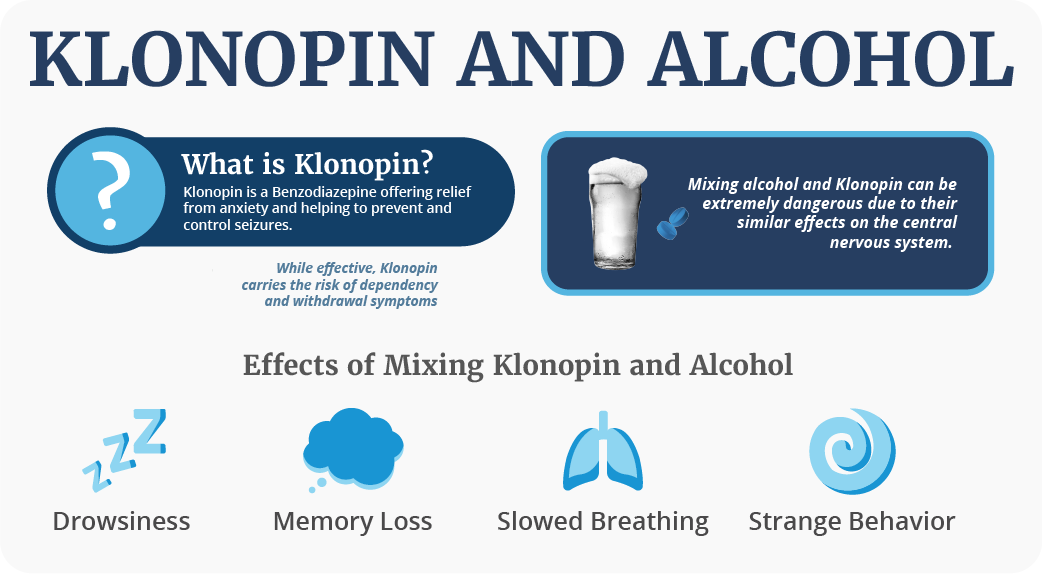Alcohol abuse is dangerous. Klonopin abuse is also dangerous. Abusing alcohol and benzos on their own is detrimental to the health of the human body; when these two substances are abused in conjunction, the danger (or even the potential danger) is nearly incomprehensible. This potentially life-threatening combination amplifies each substance’s effects; it leads to heightened risks and extreme physical and psychological complications.
It is imperative to gather a sense of awareness and prevention in safeguarding one’s health. Without an accurate understanding of the dangers of mixing these two substances, individuals may unknowingly put themselves at significant risk.
At Discovery Institute in Marlboro, New Jersey, we offer a variety of substance abuse treatment programs and other resources to help people break the cycle of addiction.
What is Klonopin (Clonazepam)
 Klonopin, generically known as clonazepam, is a type of medication that falls under the category of benzodiazepines. It’s primarily used to treat seizure disorders or panic disorders by having a calming effect on the brain and nerves. Klonopin works by enhancing the effects of a certain natural chemical in the body (GABA). However, it’s important to note that this medication can lead to addiction; it should be used under the direct supervision of a healthcare provider.
Klonopin, generically known as clonazepam, is a type of medication that falls under the category of benzodiazepines. It’s primarily used to treat seizure disorders or panic disorders by having a calming effect on the brain and nerves. Klonopin works by enhancing the effects of a certain natural chemical in the body (GABA). However, it’s important to note that this medication can lead to addiction; it should be used under the direct supervision of a healthcare provider.
Klonopin is often prescribed for short-term use due to its potential for addiction and dependency. It should not be taken for longer than 2-3 weeks unless otherwise directed by a doctor. Klonopin has also been found to be effective in managing symptoms of other conditions such as bipolar disorder and alcohol withdrawal.
While Klonopin can be extremely beneficial when supervised by a professional, there is, unfortunately, a potential for misuse and abuse. Some individuals may misuse klonopin for its sedative effects, taking higher doses than prescribed or using it without a prescription. This behavior can lead to dependency and serious health consequences. This goes to show the importance of using the medication responsibly, under the guidance of a medical professional.
What is Alcohol?
Alcohol, also known as ethanol, is a psychoactive substance commonly found in drinks such as beer, wine, and spirits. It is produced through the fermentation of sugars by yeast. Consumed in moderation, it can have a relaxing effect and is often part of social activities; this is why, oftentimes, people find themselves in patterns of abuse. Excessive consumption can lead to serious health issues, including liver disease, heart problems, and addiction.
In recent decades, there has been a growing concern about alcohol abuse and its harmful effects on individuals and society. This has led to an increase in education and awareness campaigns, as well as stricter regulations and policies on the sale and consumption of alcohol. Alcohol is often seen as a normal part of social gatherings, celebrations, and even daily life. This normalization has made it easier for individuals to develop problematic drinking habits without realizing the potential consequences.
Alcohol abuse is a pattern of drinking that results in harm to one’s health, interpersonal relationships, or capacity to work. It may involve episodes of excessive consumption and heavy drinking, which can lead to physical and psychological dependence. Symptoms might include the following:
- Continuing to drink despite clear harmful consequences
- A focus on alcohol over personal responsibilities
- A higher tolerance leads to increased consumption
Alcohol abuse is a serious problem that affects millions of people worldwide. It can have devastating consequences on individuals and those around them. While it may start as occasional drinking, it can quickly escalate into something more damaging and difficult to control. One of the most significant dangers of alcohol abuse is its impact on physical health. Excessive consumption of alcohol can lead to liver damage, high blood pressure, heart disease, and other serious health conditions. It can also weaken the immune system and increase the risk of infections.
Mixing alcohol with other substances can have potentially hazardous, even fatal consequences. When combined with other depressants, like opioids or sedatives, alcohol can dramatically increase the risk of overdose; this leads to impaired breathing, coma, or death. Even seemingly innocuous over-the-counter medications can have dangerous interactions with alcohol. Mixing them causes side effects like drowsiness, dizziness, and increased risk of liver damage.
Mixing alcohol with stimulants, such as cocaine or amphetamines, can mask the depressant effects of alcohol. This leads individuals to consume more than intended, which can result in alcohol poisoning. It is crucial to understand these risks to make informed decisions about substance use.

Dangers of Binge Drinking
Binge drinking, defined as consuming large quantities of alcohol in a single session, presents serious health risks and societal issues. It can lead to severe consequences, including alcohol poisoning, liver disease, neurological damage, and an increased risk of alcohol dependency. In addition to health problems, binge drinking often leads to poor decision-making; this can result in accidents, violence, and other law-breaking behaviors. It’s important to raise awareness about these dangers to help avoid alcohol abuse.
The Dangers of Mixing Alcohol and Klonopin
Mixing alcohol and Klonopin can be extremely dangerous due to their similar effects on the central nervous system. Both substances are depressants, which means they slow down your body’s functions. They can also lead to drowsiness, slowed breathing, impaired motor control, unusual behavior, and memory problems.
The combined effect significantly heightens the risk of these symptoms, with potentially fatal consequences such as respiratory failure. The use of alcohol and Klonopin together can also lead to an increased risk of addiction and physical dependence. It’s crucial to consult your healthcare provider about safely managing the use of Klonopin and avoid alcohol consumption while on Klonopin.
Dangers of Mixing Alcohol with Other Benzodiazepines
Combining alcohol with benzodiazepines (benzos) is extremely hazardous. Both substances act as central nervous system depressants, slowing brain function and potentially leading to serious side effects. These can range from drowsiness and dizziness to slowed breathing, impaired motor control, unusual behavior, and memory problems. In severe cases, this drug combination can lead to unconsciousness or even be life-threatening due to a fatal overdose.
Alcohol and benzos are two widely used substances that can have dangerous interactions when combined. While each substance may have its effects, the combination of both can amplify the negative impacts on the body. This is because benzos enhance the sedative effects of alcohol. These effects lead to a greater risk of overdose and potential harm to vital organs such as the liver.
What are the Effects of Klonopin Abuse
Abuse of Klonopin used primarily to treat panic disorders and seizure disorders, can lead to a variety of adverse effects. Physically, users may experience drowsiness, poor coordination, and even seizures. Prolonged abuse can lead to dependence and withdrawal symptoms upon cessation, such as restlessness and anxiety. Mentally, Klonopin abuse can contribute to memory problems, impaired judgment, and mood swings. It’s important to note that misuse of this drug can also lead to an overdose, which can be fatal. Therefore, it should only be used as prescribed by a healthcare provider.
What are the Effects of Alcohol Abuse?
Alcohol abuse can have profound effects on a person’s physical and mental health. Physically, it can lead to serious conditions such as liver disease, cardiovascular problems, and an increased risk of various cancers. Mentally, alcohol abuse can contribute to the development of mental health disorders like depression and anxiety. It can also negatively impact social relationships and work performance, leading to isolation, job loss, or financial troubles. Excessive consumption of alcohol can lead to alcohol dependence or addiction, a serious medical condition requiring professional treatment.
Treating Klonopin and Alcohol Withdrawal
Treatment for Klonopin and alcohol withdrawal should always happen under the supervision of a healthcare professional; there are many potential risks and complications. This process often involves a gradual reduction in the substances to minimize withdrawal symptoms, coupled with medications to alleviate discomfort. Psychotherapy may also be employed to address underlying issues that contribute to substance abuse. It is important to note that each case is unique, and treatment plans should be personalized to meet individual needs.
Klonopin and Alcohol Addiction Treatment
Klonopin can sometimes lead to dependency and addiction, especially when used in conjunction with alcohol. It’s important to seek professional help when dealing with addiction. A comprehensive treatment plan may include medically assisted detox, therapy sessions (both individual and group), and certain lifestyle changes.
Medical professionals ensure that the treatment process is safe and comfortable, minimizing withdrawal symptoms and guiding individuals toward recovery. At Discovery Institute, our team of professionals is committed to providing unique, individualized care. We understand that each person’s journey towards recovery is distinct and comes with its own set of challenges and complexities. The individual’s history, circumstances, and needs are taken into consideration while designing a recovery plan.

Break the Cycle of Addiction at Discovery Institute
At Discovery Institute, breaking the cycle of addiction is our utmost priority. Our comprehensive treatment programs are designed to address multiple facets of addiction. This means we treat not only the physical aspects of addiction but also the underlying mental health issues. Treating the individual as a whole is imperative to our process. Our dedicated team of professionals is committed to helping each individual discover the strength within themselves to recover. If you or a loved one are interested in finding out more, you can contact us here.
Dr. Joseph Ranieri D.O. earned his BS in Pharmacy at Temple University School of Pharmacy in 1981 and His Doctorate Degree in Osteopathic Medicine at the Philadelphia College of Osteopathic Medicine in 1991. He is Board Certified by the American Board of Family Medicine and a Diplomate of the American Board of Preventive Medicine Addiction Certification. Dr. Ranieri has lectured extensively to physicians, nurses, counselors and laypeople about the Disease of Addiction throughout New Jersey and Pennsylvania since 2012.



